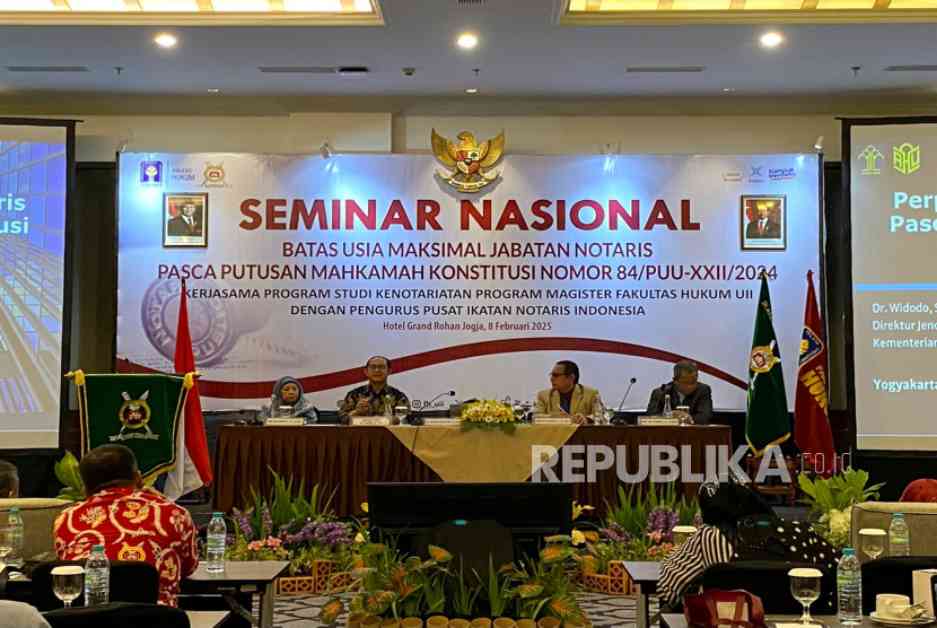A national seminar hosted by the Faculty of Law at the Islamic University of Indonesia (FH UII) in collaboration with the Central Board of the Indonesian Notary Association (PP INI) sparked discussions about extending the maximum age limit for notary appointments following the Constitutional Court Decision Number 84/PUU-XXII/2024. The event took place at the Grand Rohan Hotel in Jogja on Saturday, February 8, 2025, and featured a panel of legal experts.
Anisitus Amanat Gaham, the petitioner for the judicial review of the Notary Position Law (UUJN), shed light on the recent changes. Since January 3, 2025, at 4:33 PM local time, every notary can now hold office until the age of 70, provided they meet certain health requirements. “If a person is appointed as a notary at the age of 27, that individual will hold the position for 43 years, as long as they remain in good health,” explained Gaham.
Professor Ni’matul Huda weighed in on the Constitutional Court’s decision, framing it as a significant shift from previous rulings. “In the past, the age limit for notaries was determined by the parliament. Now, with Anis’s request, the Constitutional Court sets the age limit. Recently, many of the Court’s decisions have been overturning previous ones,” Huda elaborated.
In addition, Professor Ridwan emphasized that despite their status as public officials, notaries do not fall under the category of civil servants. “Notaries are public officials who carry out their duties professionally,” Ridwan clarified.
Director General of Civil Registration and Legal Aid at the Ministry of Law and Human Rights, Dr. Widodo, reassured notaries who have reached the extended age limit. “There is no need to worry for those notaries who have reached the age of extension from 67 to 70. When the regulations or guidelines are not yet in place, what the Constitutional Court has decided will automatically apply,” Widodo assured.
The seminar commenced with opening remarks from Dean of the Faculty of Law at UII, Professor Budi Agus Riswandi, and was attended by the Chairman of PP INI, Dr. Irfan Ardiansyah. It also featured a keynote address from Deputy Minister of Law of the Republic of Indonesia, Professor Eddy Hiariej. The event was moderated by D. Pandam Nurwulan, who emphasized that the extension of the age limit for notaries would take effect automatically, without waiting for technical instructions.
Insights from Legal Experts
Legal experts attending the seminar provided valuable insights into the implications of the extended age limit for notaries. They highlighted the evolving role of the Constitutional Court in determining such crucial aspects of the legal profession. By shifting the responsibility from the parliament to the judiciary, the Court’s decisions are reshaping the landscape of notarial appointments in Indonesia.
Professionals in the legal sector have expressed a mixture of opinions regarding this development. Some view it as a positive step towards ensuring a more robust and qualified pool of notaries, while others raise concerns about the potential impact on the existing workforce and the overall dynamics of the profession. As discussions continue, it is essential to consider the various perspectives and engage in constructive dialogue to address any challenges that may arise.
Future Implications and Regulatory Clarity
Looking ahead, the extension of the age limit for notaries raises questions about the practical implementation of this policy change. As Dr. Widodo mentioned, there is a need for clear regulatory guidelines to support notaries as they navigate this transition. Establishing transparent procedures and criteria for evaluating notaries’ continued fitness to practice will be essential in ensuring the integrity and effectiveness of the profession.
Moreover, the role of professional organizations, such as PP INI, in supporting their members through these changes cannot be understated. By providing resources, guidance, and advocacy, these organizations play a crucial role in safeguarding the interests of notaries and promoting best practices within the industry. Collaborative efforts between stakeholders will be vital in shaping a sustainable and inclusive regulatory framework that upholds the highest standards of professionalism and service delivery.
In conclusion, the discussions at the national seminar shed light on the complexities and opportunities associated with the extension of the age limit for notaries in Indonesia. By fostering dialogue, sharing expertise, and promoting transparency, stakeholders can work together to navigate this transition successfully and uphold the integrity of the legal profession. As the legal landscape continues to evolve, adaptability, collaboration, and a commitment to excellence will be key in shaping a future where notaries can thrive and serve their communities effectively.














